Politics
Leanne Wood’s long campaign
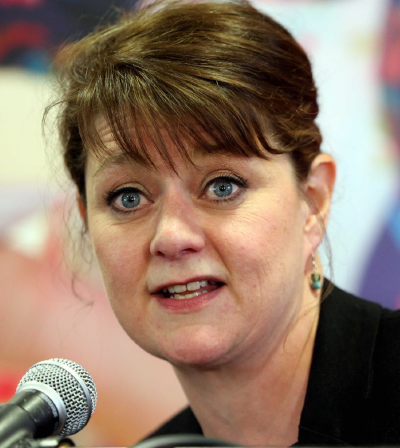
 LEANNE WOOD was not at all satisfied with a fourth place finish in the 2015 General Election.
LEANNE WOOD was not at all satisfied with a fourth place finish in the 2015 General Election.
Her immediate response to the loss – and the mere hold of her three MPs – was to declare that the campaign for the National Assembly elections of May 2016 would commence without pause.
This most recent campaign has been the culmination of decades of political action: miner’s strike, devolution, various assembly elections, and the 2011 referendum.
Already in campaign mode, and convinced that there would have been a breakthrough in the General Elections with a few more weeks to campaign, Wood began a series of major engagements: visiting local constituencies, attending cultural events, making visits to schools and giving major addresses on politics and policy at Aberystwyth University. Linking up her network on the ground, Wood engaged local organisations in the campaign, giving speeches at party events and demonstrations, outlining her message for the May elections.
With the “What Next for Wales?” campaign in full gear, she decisively answered a quip by one of her aides Simon Thomas, who suggested that she was better suited to campaigning than to intellectual “stuff” (Wales Online, 12 May 2015). Wood countered by not only giving many speeches on policy and political affairs, but also by using the campaign itself to disseminate her ideas and build her network across Wales.
The long campaign has been energised by immense personal loyalty that Plaid members’ have for Wood’s leadership. No one questioned her strategy of an immediate campaign, but picked up their shovels and joined her work for a change of government in Wales.
Leanne Wood is certainly seeking national liberation for Wales. Yet, independence is her longest campaign. She is often asked by commentators how she squares her quest for a socialist republic with the pragmatic necessity of getting on with the “system as it is”.
She will answer that the “system as it is” is the result of historical action and events, and that the people of contemporary Wales have the same capacity for action and change. In a post-devolution framework, moreover, the National Assembly is a state in embryo, one which can be brought to fruition with the enhancement of its autonomy and powers, over eg. social security, healthcare, taxation, policing and criminal justice, natural resources, drug policy, land policy, airspace – and other powers appropriate for a European-oriented democratic republic and nation in its own right.
For Wood, Wales is a nation to come, one that will be built by the generations of those who live here, by a multi-lingual and multi-ethnic population, for the sake of a better life and a stronger, more local, democracy – one that serves the wishes and aspirations of Wales.
Leanne Wood was never going to be the usual politician.
Her expulsion from the National Assembly on her first day as AM was hardly auspicious – or was that her point after all? She was contesting, re-valuing, a distinctly British value – honour to the Queen – to the British sovereign – of one unelected versus Wood’s own democratic mandate.
Wood began her political career with a denunciation of British sovereignty over Wales. She campaigns now for the governance of Wales, for First Minister and the acceleration of the national process.
Yet, the building process, though it would be greatly accelerated by a Plaid victory, does not of itself require a nationalist government, but an intensified movement for home rule, enhanced powers, and compliance of the UK government with the 2011 referendum.
Wood has nearly perfected the campaign as a form of organising political change. A campaign is a real time affair that provides the vast array of individual events with a cohesive momentum. If one is committed to forming a new nation, one must cultivate the most broad-based and effective national outreach network, a campaign that is the process of nationbuilding itself.
In this way, even if she comes up short in May to form an outright government, Wood will have an even stronger voice for transformative politics as the leader of the progressive opposition (especially as the Tories will still hold Westminster), one that remains strongly linked to mass organisations on the ground, such as Adam Price’s Yes Cymru, and with the UK-wide progressive opposition in activist networks and in the UK parliament.
Currently contending with Labour for the leadership of the National Assembly, Wood’s long campaign has paid off, and even offers the chance for accelerated national transformation.
As momentum is moreover connected to political direction, the winds are clearly in the Wood’s favour as the necessity for a mature national framework has become increasingly urgent for the protection and development of Wales.
Farming
‘Poor decision’ New Creamston housing condition overturned

A “POOR DECISION” agricultural worker-only imposed nearly 40 years ago has been removed from a Pembrokeshire property by county planners.
In an application recommended to be approved at the December meeting of Pembrokeshire County council’s planning committee, Tim and Cathy Arthur sought permission for the removal of an agricultural worker-only condition at New Creamson, Creamston Road, near Haverfordwest.
An officer report for members said the agricultural condition was imposed when the dwelling was built in 1988/89, with a later certificate of lawful development granted this year after it was proven the site had been occupied for more than 10 years on breach of that condition.
An application for a certificate of lawfulness allows an applicant to stay at a development if they can provide proof of occupancy over a prolonged period.
Speaking at the meeting, agent Andrew Vaughan-Harries of Hayston Developments & Planning Ltd told members the original agriculture-only condition was a poor decision by planners back nearly four decades ago.
“When this application was made in 1988-89 we go back to the Preseli District Council – I was still in school – it was only a 50-acre farm, it should never have been approved as it shouldn’t have been viable.
“The current applicants have owned it for the last 20 years; they’ve tried to grow apples but couldn’t make a go of it and then went in to holiday lets. We can’t enforce redundant conditions from bad decisions made years ago.”
Approval was moved by Cllr Brian Hall and unanimously supported by committee members.
Health
‘We are on our own’: Unpaid carers forced to ‘beg’ for support
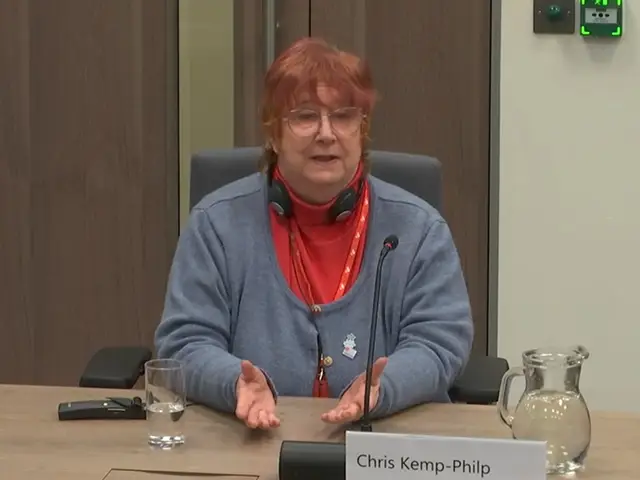
UNPAID carers are being left to “pick up the pieces” of a broken system due to a lack of respite, unsafe hospital discharges and carer’s assessments that result in “nothing at all”.
The warning came as the Senedd’s health scrutiny committee began taking evidence for an inquiry on access to support for more than 310,000 unpaid carers across Wales.
Chris Kemp-Philp, from Newport, who has been a carer for 33 years, gave up her career to become a full-time carer after her husband medically retired from the civil service in 1990.
Ms Kemp-Philp, whose husband died in April, told today’s (December 4) meeting: “I thought he’d been really badly treated… The last four months of his life were dreadful for both of us.”
She was only offered an updated carer’s needs assessment – a right under the 2014 Social Services and Wellbeing (Wales) Act – the day after her husband died.
Ms Kemp-Philp did not realise she had become a carer at first. “But, of course, having lost two incomes and to survive on a half civil service pension wasn’t great,” she said.
She told the committee how the couple “shielded” during the pandemic, saying: “For the past five years, basically, apart from going to a hospital or… a medical facility – I didn’t leave the house because if I’d have gone out, I could have brought something home.
“So, we spent five years literally avoiding people. The experience was unpleasant, I had two great-grandchildren born in that time and I only saw them on video.”
Ms Kemp-Philp said her husband was “pingponged” back and forth after unsafe discharges from hospitals in Gwent. He was put in a car by two nurses then she had to get him out on her own at the other end, with clinicians effectively telling her: it’s your problem now.
“Every time he was sent home, nobody came to help at all,” she said, explaining how she struggled to cope and her husband’s death brought a tragic sense of relief.
Judith Russell, who moved back to Wales to care for her mother 23 years ago, told Senedd Members the responsibility grew greater over the years.
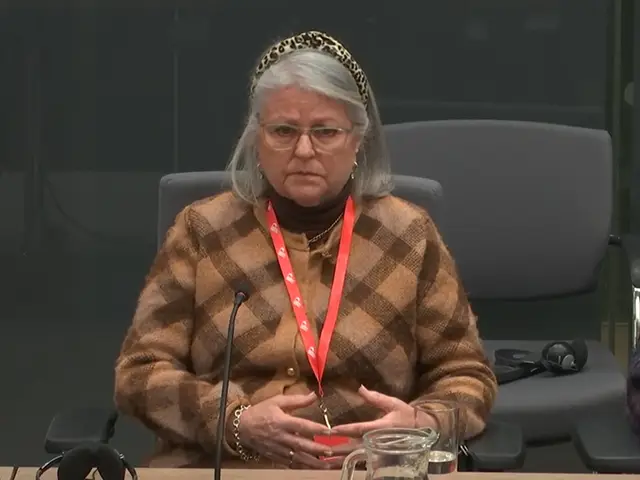
Ms Russell, whose mother died last Saturday on the eve of her 102nd birthday, told the committee: “It’s been my privilege to care for her but I wish other people—I wish there had been more actual care for her. That’s it.”
Ms Russell also cares for her husband who has Alzheimer’s disease, acts as guardian for her disabled sister and cooks every week for her sister-in-law.
“It’s quite a responsibility,” she said. “My life is taken up with caring. I didn’t actually know I was a carer, I cared for my mother because she was my mother – I looked after her, of course I did – and it wasn’t until about three years ago that I identified as a carer.”
Ms Russell warned: “All through this last 23 years, I’ve had to fight and struggle to find things out… there’s very, very little help out there.”
She said she was given a carer’s assessment earlier this year but “there was nothing they could offer me, quite frankly – nothing at all”.
Ms Russell told Senedd Members: “We had a diagnosis [but] there’s no offer of help, there are no directions to find help, somebody to point you – you should be doing this, this is available, that’s available – nothing, you’re on your own completely.”
She joined the Bridgend carers’ group which opened a door to other people grappling with the same weight of responsibility and helped navigate the system. Ms Kemp-Philp added that joining a similar peer support group saved her life.
Ann Soley, who is originally from France and has been living in Wales for eight years, described how life was turned upside down when her British husband had a stroke.
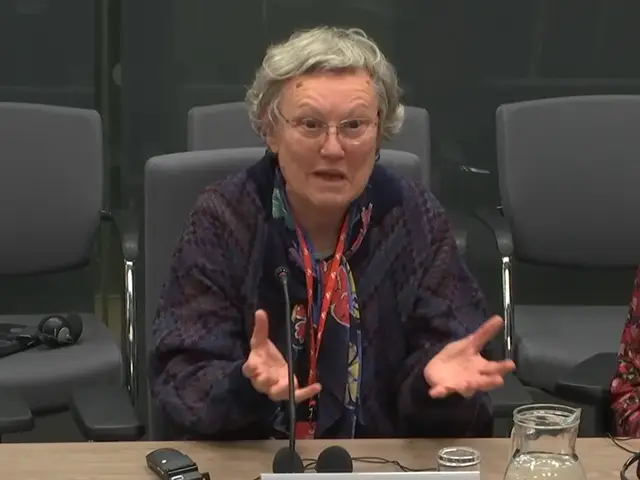
She said: “We are stressed, we are lost. A lot of carers have lost their friends, that is just unbelievable for me because I realised society is not there – there is no compassion.”
Kaye Williams, who works at Bridgend carers’ centre and is herself a carer, warned the witnesses’ experiences are commonplace across the country.
Sue Rendell, from Caernarfon, has cared for her husband who has vascular parkinsonism for nearly 14 years and was waiting for a doctor to call as she gave evidence remotely.
She told the committee: “You go in in the morning to see if he’s still breathing to be honest. We’re at the later stages of his disease and it’s physically demanding, it’s mentally demanding and it’s administratively difficult as well… it’s just very wearing.”
Ms Rendell, who was shattered after a late night caring, said she has tried to get respite but has been told there’s nothing available in Gwynedd nor Anglesey for her loved one’s needs.
She told the committee unpaid carers in Wales are “expected to pick up the pieces” but “nothing much happens” after an assessment. “Fine words butter no parsnips,” she said.
Ms Russell added: “As carers, we save the government millions… and I asked for some help this week actually. I’m 258th on the list for a hip replacement… and I asked the doctor: as a carer, couldn’t I possibly go up the list a little bit? ‘No, we’re not allowed to do that.’
“It’s the only thing I’ve ever asked for.”
Education
‘Sink or swim’: Young carer sat exam hours after 3am hospital ordeal
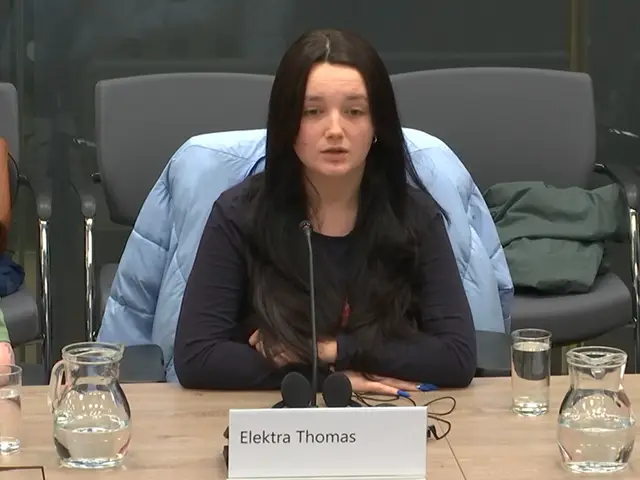
A TEENAGE carer sat a GCSE exam only hours after getting home from a hospital at 3am following a family emergency, a Senedd committee has heard.
The warning came as witnesses highlighted a “sink-or-swim” reality where children as young as three are taking on caring roles while feeling invisible to schools and social services.
Elektra Thomas, 15, who cares for her autistic, non-verbal brother and her epileptic sister, was part of a remarkable and articulate trio of teenagers who gave evidence to a new health committee inquiry on access to support for unpaid carers today (December 4).
The teenager helps her brother Blake get ready for school in the morning and helps him communicate by acting as his voice, which she has done since about three years old.
Ms Thomas told Senedd Members her sister has two children, “so I’m either handling her having a seizure, running around with her medication… or I’m looking after her kids”.
She said: “I’ve been having school assessments at the same time she’s had a seizure. I’ve been in ambulances waiting for her to get into a hospital while also studying.”
Ms Thomas explained how she is unable to focus on her schoolwork if her brother has had an overwhelming day. “I can’t focus on myself and I don’t have time for myself,” she said.
The teenager, who is from Carmarthenshire, described how she was once in hospital until 3am then sat a test – which went towards her GCSE grades – that same day.
Ms Thomas warned young carers do not have time to manage their own mental health, saying: “I didn’t have time for myself, I had time for my brother and sister and that was it.”
She said: “As a young carer who wasn’t noticed for a decade, it was pure manic: I had no coping skills, I had no support – and this has been going on since I was about three or four.”
Ffiôn-Hâf Scott, 18, from Wrexham, who is working while studying in sixth form, has similarly been a carer since she was four years old.
“I used to care for my mum and my sister,” she told the committee. “My sister used to be in a psychiatric ward, she was there for seven years.
“And I care for my mum because she’s diabetic, classed as disabled, has a long list of mental health issues, she has in the past suffered a stroke and had cancer.
“I don’t know how she’s still standing.”
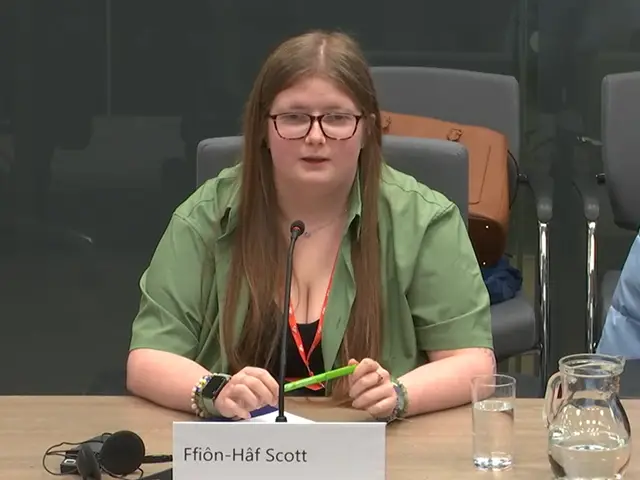
Ms Scott said: “The main challenge right now is looking after myself and learning that you actually have to keep yourself afloat… to keep looking after someone else.
“I think for a very long time I ran on nothing because of my caring role or I didn’t think about the things I needed to do for me, so respite and things like that.”
The Welsh Youth Parliament member warned a lack of support for young carers has been normalised, saying she has had to explain herself 70 different times while aged 12.
Ms Scott said: “I remember going to my teacher and saying – we had a piece of coursework – look I can’t do this right now… you’re going to have to fail me…
“Their response was just ‘well, you have too much on your plate and you need to take things off your plate’ and I was like: it’s very bold of you to stand where you’re stood and say that to me because it’s not a choice to take on the things that we do take on.”
She recalled receiving a phone call about her mum collapsing moments before a maths test and expressed concerns about the prospect of mobiles being banned in schools.
Albie Sutton, 16, a young carer from north Wales, looks after his disabled mother by doing things such as cleaning the house, budgeting and cooking for the family every day.
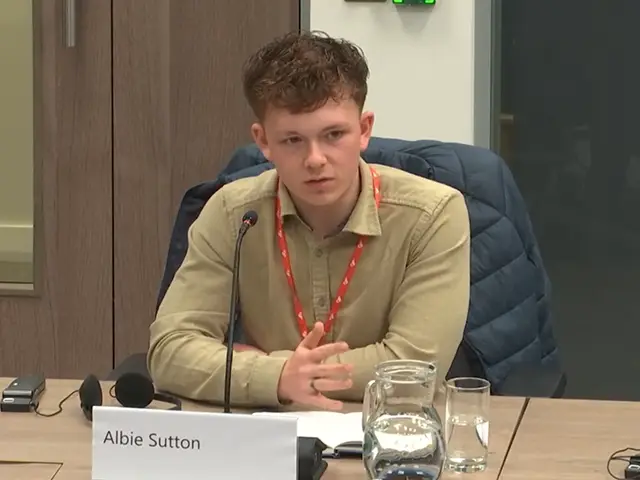
Mr Sutton said: “It’s a real struggle for her to move around the house, to even do stuff like getting dressed or moving to the toilet by herself… so I’ve got to help her.”
The teenager estimated his caring role takes up about 25 hours a week and makes it difficult for him to pursue some of his hobbies such as competing in powerlifting.
“My mind feels like a hive of bees,” he said. “There’s so many things going in and out… I get home at the end of the day and I’m like ‘oh my God, I’ve got to do this, I’ve got to do that’.”
Warning of the mental stress, he added: “It’s also really difficult for me to socialise… I feel very isolated in my caring role, especially at home. I’m always housebound, I never get the opportunity even just to go out in my local town.”
Mr Sutton told Senedd Members it plays on his mind that his younger brother may have to take on responsibility. “It’s got me debating whether I can go to university,” he said.
He called for a Wales-wide campaign to raise awareness among educators and employers of the issues young carers face and how to recognise the signs.
Ms Thomas agreed: “I’ve had multiple teachers look at me and go ‘what’s a young carer, sorry?’. I’ve had pharmacists go ‘are you sure you’re a young carer?’ and it baffles me.”
-

 Crime2 days ago
Crime2 days agoDefendant denies using Sudocrem-covered finger to assault two-month-old baby
-

 Crime1 day ago
Crime1 day agoPembroke rape investigation dropped – one suspect now facing deportation
-

 Crime6 days ago
Crime6 days agoMan denies causing baby’s injuries as police interviews read to jury
-

 News1 day ago
News1 day agoBaby C trial: Mother breaks down in tears in the witness box
-

 Crime2 days ago
Crime2 days agoLifeboat crew member forced to stand down after being assaulted at Milford pub
-

 Crime3 days ago
Crime3 days agoDefendant denies causing injuries to two-month-old baby
-

 Crime3 days ago
Crime3 days agoPembrokeshire haven master admits endangering life after speedboat collision
-

 Crime15 hours ago
Crime15 hours agoMother admits “terrible idea” to let new partner change her baby’s nappies alone

















